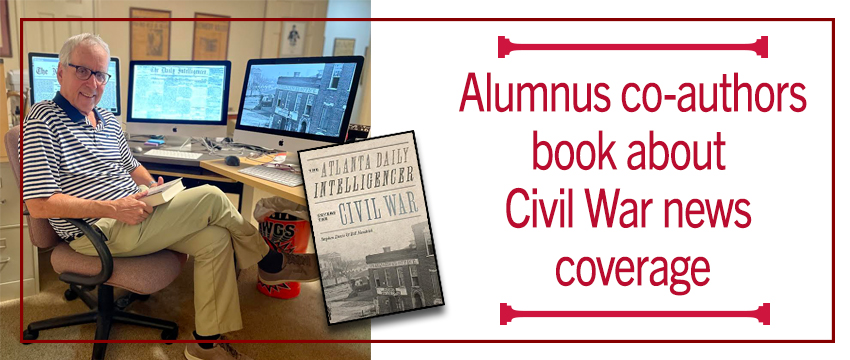Alumnus writes book about Civil War newspaper

Alumnus writes book about Civil War newspaper
Biased news is a common criticism about some news outlets today, but as Bill Hendrick (ABJ ’71) pointed out in his recently-published book, it’s not a new complaint.
Hendrick and co-author Stephen Davis, examine the methods a local newspaper covered the War Between the States in their new book, “The Atlanta Daily Intelligencer covers the Civil War.” The Atlanta Daily Intelligencer was described in the book as “a pro-Confederacy, anti-Lincoln propaganda organ.”
Davis, a historian by trade, wrote about the battles and the strategy in winning them, while Hendrick focused on how the newspaper covered the war, received updates from the battlefront and wrote about human interest stories like messy divorce cases and people who were drunk. And, the advertisements are almost as interesting as the news, Hendrick adds.
“I think that’s what’s interesting to most people about the Civil War — it doesn’t make any sense. The communication was bad and sporadic and that’s what my interest is: how journalism was accomplished back then,” Hendrick said.
Journalism has been a lifelong interest for Hendrick. From the décor in his home office that includes preserved and framed front pages from newspapers declaring “Germany Surrenders Unconditionally” and “Nixon Resigns,” to his preserved collection of journalism artifacts that includes an issue of Harper’s Weekly from 1863, Hendrick is fascinated by the way events are covered in the news.
Hendrick’s interest in newspapers was influenced by his career, which started as a journalism student at Grady College in the late 1960s. Following graduation, Hendrick traveled to international cities like Budapest, Berlin, Warsaw, Buenos Aires and England, as an AP correspondent before landing a job as a reporter at The Atlanta Journal-Constitution. He wrote about business news, features, metro and science— almost everything except sports, but he even reported on an occasional football game now and then.
It was a story he was writing for the AJC that piqued his interest in The Atlanta Daily Intelligencer. He was reporting on a site downtown Atlanta where a Rich’s department store had been demolished. Under the rubble, a shell was found that had been fired by Gen. William T. Sherman, but had not detonated. His research led him to interview the historian Franklin Garrett, which started the path of Civil War research.
Hendrick explains that news gathering was quite different back then and most news arrived by telegraph where people had to pay by the word, so dispatches were short and sweet and sometimes took several days or weeks to be reported.
“It was hard to tell what was a story and what was an editorial, and they were pretty much editorializing in every story. It’s obvious in the book that you see things that no newspaper would allow anyone to get away with now,” he explained. “For instance, when reporting the Battle of Gettysburg, The Atlanta Daily Intelligencer didn’t admit it was a Confederate defeat for more than four months even though they had all kinds of information that it was a serious loss. They put the best possible face on it. For instance, instead of saying ‘General Lee retreated across the Potomac,’ they would say ‘General Lee redeployed his troops across the Potomac’—like he had a grand scheme to do something else. They put their best face on it or they would ignore it.”
Hendrick also said the reporters were not afraid to mince words, routinely writing things like ‘President Lincoln is baboon.’ As soon as Lincoln was assassinated, the reporters changed their tune because they disliked President Andrew Johnson more.
Hendrick and Davis started writing their book in 2017 and met almost daily for several years to complete it. They employed many resources including leaning heavily on library research, their personal book resources and internet resources like Newspapers.com.
After more than 45 years as a reporter, Hendrick has some advice for today’s journalism students.
“Always be early,” is his first piece of advice. “Be strictly objective, always hide your point of view if you have a point of view, get it right and be fast.”
“I have had a great career and have traveled the world over,” Hendrick concluded. “I lived in the heyday of newspapers and every journalist wants to write a book, which I have now done. I found a subject about a newspaper that could sink my teeth into, and I did.”